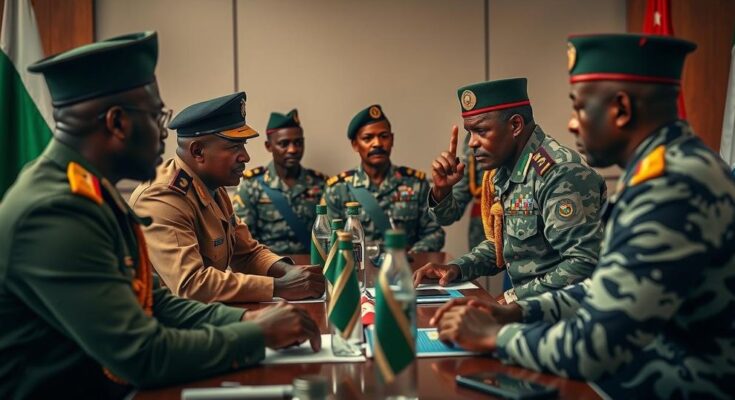U.S. envoy Tom Perriello held his first talks in Sudan with army chief Abdel Fattah Al-Burhan, focusing on halting fighting and enhancing humanitarian aid access amidst a severe crisis since war erupted in April 2023. The discussions reflect ongoing diplomatic efforts to reinstate civilian governance and improve conditions for millions affected by the conflict. Notably, international geopolitical tensions, marked by a Russian veto on U.N. action, complicate these humanitarian initiatives.
On Monday, U.S. special envoy Tom Perriello undertook his inaugural visit to Sudan, engaging in discussions with General Abdel Fattah Al-Burhan, the army chief and de facto leader, in Port Sudan. The discussions focused on strategies to halt ongoing hostilities and facilitate humanitarian assistance amid escalating violence since the conflict began in April 2023. Al-Burhan’s Sovereignty Council characterized the dialogue as “long, comprehensive and frank,” emphasizing collaborative efforts to establish a ceasefire and ensure humanitarian aid delivery. The backdrop of Government-led discussions unfolded against a troubling humanitarian crisis, with fatalities and displacement since the war erupted, impacting millions and resulting in one of the most severe crises globally. Perriello’s visit is significant, marking the first diplomatic effort since Sudan’s military withdrew from U.S.-facilitated negotiations in Switzerland. His engagement involved direct conversations regarding the urgency of ceasing combat, facilitating humanitarian access, and committing to a return to civilian governance. In a statement, the U.S. State Department highlighted the urgency for localized fighting pauses to expedite the delivery of essential supplies. Additionally, following Perriello’s talks, Burhan cautioned against the usage of the Adre crossing border point, linking its exploitation to potential arms deliveries to the paramilitary Rapid Support Forces (RSF). This nuance underscores the complexity of facilitating aid in regions experiencing conflict where both sides are implicated in obstructing humanitarian relief efforts. The situation is further complicated by geopolitical tensions, exemplified by Russia’s veto of a U.N. Security Council resolution aimed at halting hostilities in Sudan, revealing a divide among permanent council members that hampers effective action. Perriello’s remarks via social media reflected hope towards expanding humanitarian access, reiterating the U.S. commitment as the leading aid donor to Sudan. The envoy reaffirmed, “We will work around the clock to ensure that food, water, and medicine can reach people in all 18 states plus refugees.” Despite international mediation efforts from multiple stakeholders, significant obstacles persist, reflecting a stalemate as both military factions prioritize tactical advantages over peace.
The conflict in Sudan escalated in April 2023, when a power struggle between the regular army and the Rapid Support Forces led to widespread violence. The fighting has created a dire humanitarian crisis that has claimed tens of thousands of lives and displaced millions. The international community, including the United States, has sought mediation and support for humanitarian aid delivery, but attempts have faced complications due to political dynamics and military actions by both parties. Tom Perriello’s visit highlights ongoing diplomatic efforts to resolve the crisis and address humanitarian needs.
In conclusion, Tom Perriello’s visit to Sudan underscores the United States’ commitment to addressing the humanitarian crisis and encouraging a cessation of hostilities amid a complex political landscape. As peace efforts continue, the cooperation between military leaders and international actors remains crucial. The ongoing challenges in facilitating aid and negotiating peace demonstrate the complexities inherent in the Sudanese conflict, requiring sustained attention and collaboration from the global community.
Original Source: www.arabnews.com




